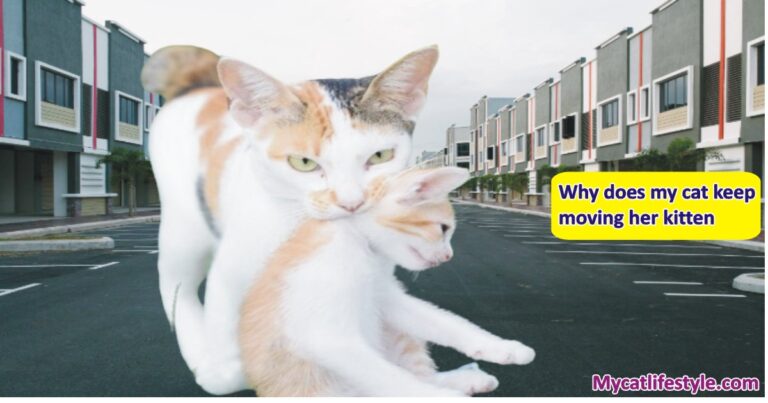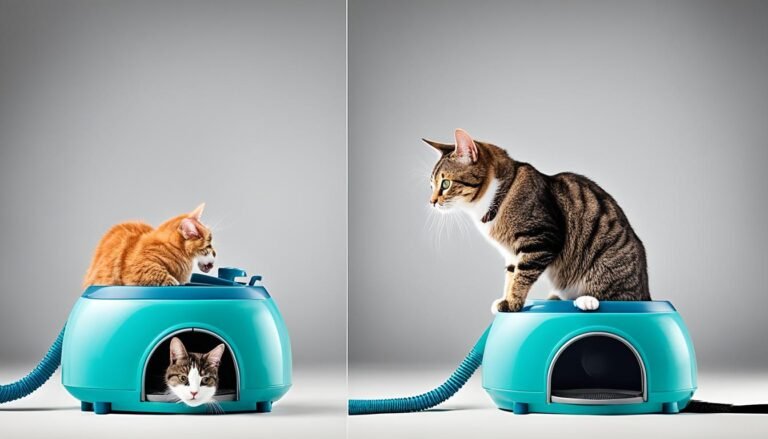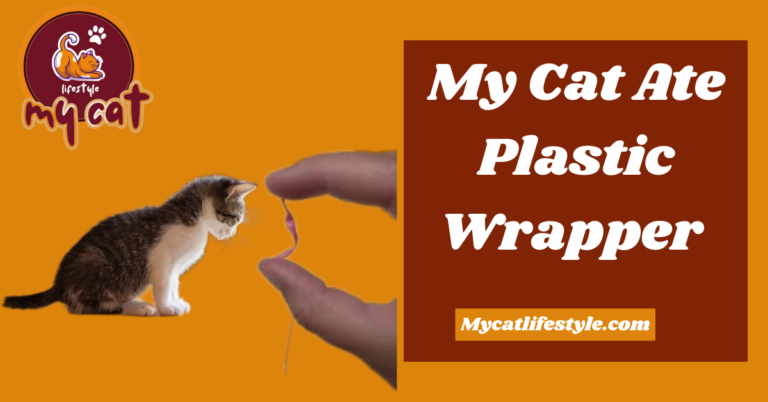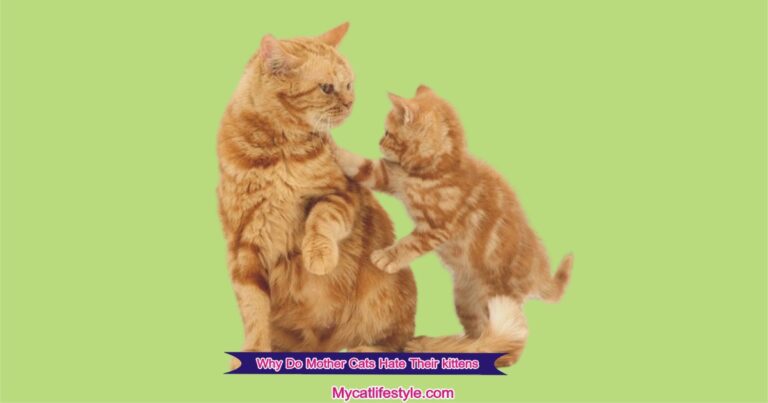Why Does My Cat Hiss at Her Kittens? Understanding Feline Behavior
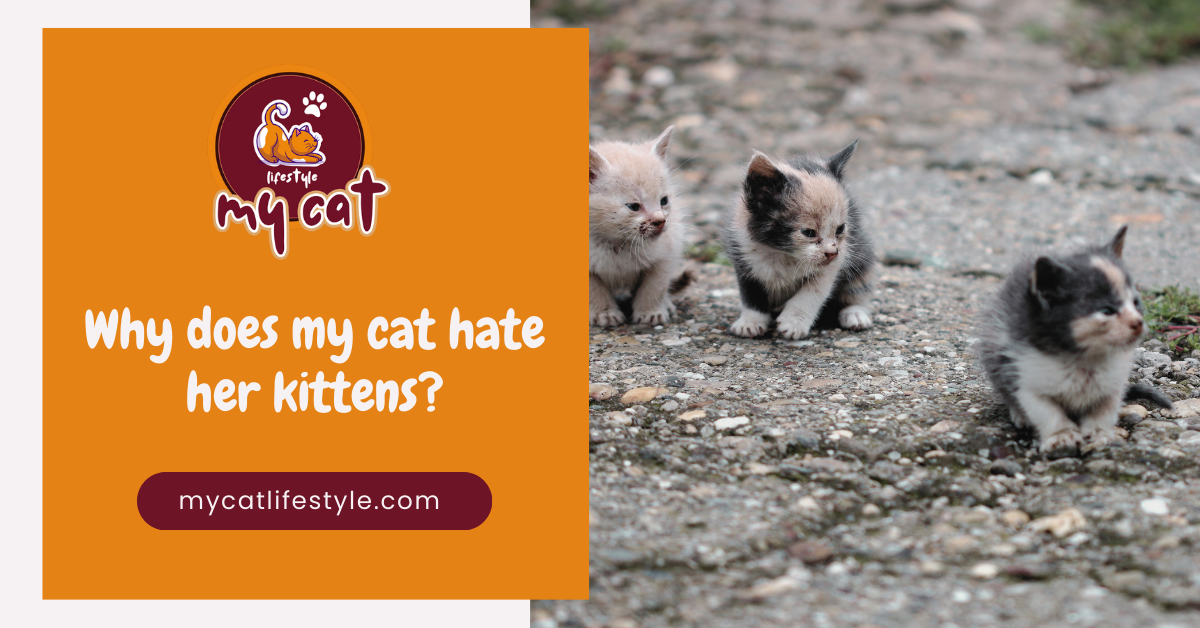
When a mother cat is hissing or even hitting her kittens, it can be puzzling and a little concerning. However, this behavior is often a natural part of a cat’s way of disciplining and training her young. Cats instinctively use vocal expressions like hissing and growling to communicate and establish boundaries. This might seem alarming, especially if you’re witnessing your 5-week-old kittens being spitting at or attacked by their mother. But in most cases, this isn’t a sign of abuse or physical harm; it’s just the mother cat’s way of guiding her kittens through the process of learning survival skills. It’s essential to observe from a distance without interfering, as disrupting this dynamic can cause more harm than good.
As the kittens grow, you may notice that the mother becomes more uninterested in feeding them, allowing them to explore food on their own and use the litter tray. This behavior might appear aggressive or perplexing, but it’s a crucial part of their development. Cats are territorial creatures, and as the kittens begin to drive towards independence, the mother might show signs of wanting them to start their own lives away from her. Multiple factors like territories and personalities play a role in how this transition unfolds. Sometimes, the mother will even tolerate her offspring until they can find their own space in the home. Understanding these scenarios helps in creating a peaceful environment, where each kitten can thrive without feeling like a threat to the mother’s established territory.
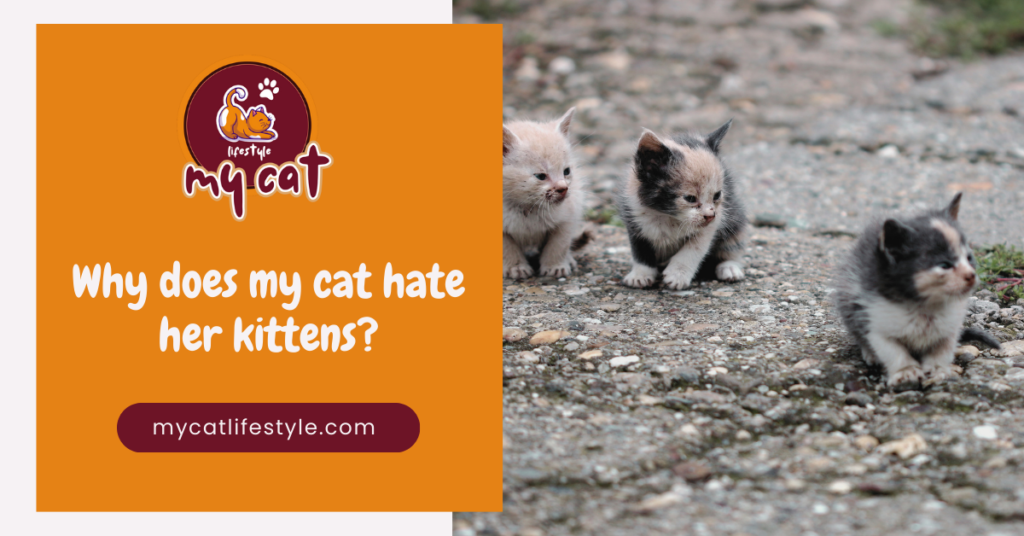
Why Do Cats Hiss in the First Place?
Cats often hiss as a warning to others when they feel annoyed or threatened. I’ve seen my own cat let out a hiss when my Labrador got a bit too overly friendly and bounced up to her, not understanding that she wasn’t in the mood to play. This hiss is a clear signal to “back off,” giving the cat the space she needs. Sometimes, it’s not just about being bothered—cats can also hiss when they are in pain, like from arthritis or another underlying issue. The sharp teeth they show during a hiss can look pretty scary, but it’s really just a way for them to say they’re feeling upset and want some space.
When a cat hisses at her kittens, it might seem harsh, but it’s a way for her to establish boundaries. This hiss isn’t just a simple reaction; it’s part of a broader variety of things a cat does to communicate. Whether it’s a scary threat or a gentle reminder, the hiss is a versatile tool. Cats might also hiss to notifies us or another animal that they are uncomfortable. Understanding this behavior helps us recognize when our cats need us to step back or give them more room, especially when they’re dealing with new situations like introducing a kitten into the household.
Why Is My Cat Hissing at Her Kittens? Possible Reasons
Cats are naturally solitary animals who love to be in control of their environment. When new kittens are introduced into a home, the resident cat might start hissing to communicate discomfort. This reaction is often triggered because the kitties are disrupting the older cat’s routine. Playing, sneaking, and even snoozing in the wrong spot can cause the older cat’s tempers to flare. It’s normal for a resident cat to need time to adjust and settle into the new situation, as sharing space with others can be challenging for them.
Additionally, a cat might hiss to try and limit conflict and maintain its sense of independence. The introduction of new kittens can disturb the established order, and a hiss serves as a way to set boundaries. This behavior isn’t unusual; it’s just a part of how cats connect and establish their own space. Over time, as the kittens learn their place, things should begin to calm down, and the cats will start to find their rhythm together.

1.Territory
When a new kitten enters the household, the resident cat may experience anxiety as their established role as the primary occupant feels threatened. Cats are highly territorial animals, and they can become hesitant to share their space with a new member. The sudden presence of another kitten can trigger a hiss as a way to express that their territory has been invaded. This reaction is not just about aggression; it’s a natural response to what they perceive as a threat to their comfort and control over their area.
To minimize these territorial tensions, it’s important to provide each cat with their own essentials like food, water, and a litter box in separate areas of the house. This helps them feel secure in their own personal space and prevents confrontations. Offering easy exits or places to escape can also ease the stress of sharing turf with a new kitten. By understanding and respecting your cat’s need for territorial boundaries, you can help both the older cat and the newest member of the household adjust more peacefully.
2.Protective of Space
When a new kitten is introduced into the house, the resident cat may become reluctant to share its space. This is because the cat sees itself as the master of the house, and it’s used to having things its own way. Kitties are creatures of habit, and sudden changes, like a new kitten, can lead to feelings of unhappiness. The older cat might start hissing as a way to express its discomfort with the new arrangement.
To help ease this transition, it’s important to ensure that each cat has its own resources. Provide an extra litter box, separate areas for sleeping, and easy access to food, water, and scratching posts. Creature comforts like favorite toys and cozy hiding spots can also make a big difference. By giving the resident cat the space it needs, you can help reduce tension and make the adjustment period smoother for both kitties.
3.Hierarchy
In the world of cats, there’s often a clear hierarchy that gets established, especially when a new kitten enters the home. If your older cat is reserved and used to being in charge, they may hiss to warn the younger kittens not to overstep their boundaries. Kittens are often notoriously playful and boisterous, and this can easily annoy the older cat. A quick hiss is the older cat’s way of setting the ground rules and forming boundaries in the household.
When the new kitten over-steps the mark, the older cat’s reaction is usually about maintaining order. This behavior is typical as the solo cat wants to ensure that the newcomers know their place. It’s important to let the older cat handle these interactions to some extent, as it’s a natural way for them to teach the younger ones how things work. By understanding this hierarchy, you can better manage the dynamics in your home and help your cats coexist peacefully.
4.Feeling Trapped
When cats feel boxed in or overwhelmed, especially after a new kitten is introduced into their space, it can trigger a fight-or-flight response. If they can’t find an exit or walk away from the situation, they may choose to fight by letting out a hiss. This is their way of saying they’re anxious and need more space. To avoid this, it’s important to ensure that kitties always have exits available and plenty of room to move around. Confining them together without an easy way out can make them feel trapped and stressed, leading to increased tension.
If your cats are not getting along, it’s crucial to give them distance and time. Providing a distraction, like a toy on a string, can help diffuse the situation by encouraging the kitten to chase it into another room. Make sure to keep the doors open so they can choose to meet on their own terms and never force them to be together. This way, your cats will feel more confident and secure in their environment, which is an essential step toward achieving peace and harmony in your home.
5.Exhausted Motherhood
Sometimes, a mother cat might let out a distinctive hiss as a way to express her need for a break. After showing tireless dedication to caring for her kittens, she might start yearning for some solitude. This behavior is a natural part of motherhood, where the hiss acts as a vocal plea for a “moment to myself.” It’s her way of signaling that she needs some space, and it’s important to respect that.
When this happens, separating the kittens temporarily can help the mother cat regain her energy without causing any unintended discomfort. Understanding this need for a break is crucial for ensuring the well-being of both the mother and her kittens. Giving her that time alone is not only natural but also beneficial, allowing her to return to her nurturing role refreshed and ready to care for her young.

6.Weaning Woes
As kittens grow into adolescence, they start to resist the natural cues for weaning. During this time, the mother cat may begin hissing or even growling to convey that it’s time for the young ones to become more self-sufficient. This behavior typically starts around six weeks as the kittens transition away from maternal nursing to a more independent diet. The mother’s actions are her way of reclaiming some personal time and freedom while ensuring that her kittens are prepared for life on their own.
This transition can be challenging, but it’s a necessary part of the kittens’ development. By encouraging the kittens to be independent, the mother cat is helping them learn essential survival skills. Her hissing is not a sign of aggression but a natural response to guide them through this important stage. Understanding this behavior can help you support both the mother and her kittens as they navigate the weaning process.
7.Hunting Hiatus
As a mother cat starts to venture out for food, she might temporarily use hissing as a tool to discourage her kittens from following her. This behavior is a way for the mother cat to signal that she needs to go on a solo hunting expedition. During these times, the mother needs to focus and be free from the distractions and noises that the kittens might cause. The hissing serves as a temporary measure to ensure that the hunt is successful and that she can bring back food for her young ones.
This behavior is natural and should be seen as part of the mother cat’s instinct to protect and provide for her kittens. By keeping the kittens at a distance during these moments, she is ensuring that her focus remains sharp, which is essential for a successful hunt. Once the hunting is done, she will return to her usual nurturing self, but during the hunt, her priority is to minimize any distractions to ensure the best outcome.
8.Farewell to Childhood
When kittens are nearing adulthood, a mother cat may start to hiss or growl more frequently. This might seem harsh, but it’s actually a symbolic gesture of encouragement for the young ones to begin their independent journeys. The behavior is a natural part of feline parenting, signaling that it’s time for the kittens to find their own place in the world. While it may appear ruthless, this is simply the mother cat’s way of guiding her kittens through the natural progression of growing up.
As the kittens grow, this behavior serves as a reminder that they need to become self-sufficient. The hissing and growling aren’t acts of aggression but rather important signals that the kittens must learn to live on their own. This is an essential step in their development and reflects the mother’s instinct to prepare them for life beyond her care.
9.Hormonal Harmony
Sometimes, a mother cat’s maternal behavior can be influenced by hormonal imbalances or genetic factors. These disorders can cause changes in how a cat regulates her maternal behavior, leading to unexpected reactions like hissing at her kittens. For instance, hormonal variations or deficiencies in certain genes can affect a cat’s ability to display normal mothering behavior. In some cases, abnormalities like false pregnancies or stress-induced issues can further contribute to these aberrant behaviors.
10.Disrupted Routine
Cats are known as creatures of habit, and any alterations to their routine can lead to anxiety or confusion. When a new kitten or other new family members are introduced, it can disrupt the established order in the home. This disruption may cause the resident cat to start hissing or growling as a way of expressing their discomfort and unease. These expressions are the cat’s way of coping with the changes and trying to regain a semblance of normalcy.
To help your cat adjust, it’s important to understand these reactions and take steps to alleviate their stress. By gradually introducing the new kitten and maintaining as much of the old routine as possible, you can help reduce the cat’s anxiety. This approach will allow the cat to feel more secure, making the transition smoother and helping to prevent further negative reactions.

How Can You Treat Your Growling Mother Cat?
When dealing with a mother cat showing aggression or inattentiveness toward her kittens, it’s important to consider that her behavior might be linked to underlying issues. A tailored approach is necessary for management, which could include separation of the mother and kittens if her maternal behavior is causing harm. In some cases, hand-nursing or fostering the kittens might be needed. Monitoring the situation through careful observation and maintaining a calm, quiet nest space can also help the mother recover and display more essential behaviors toward her kittens.
For more severe cases, medical intervention might be required. Hormone therapies can be effective in alleviating symptoms and managing nervous behaviors. In certain situations, spaying could be the best option to cure the disorders and prevent their recurrence in future pregnancies. Understanding and addressing these underlying conditions is crucial for ensuring the well-being of both the mother and her kittens.
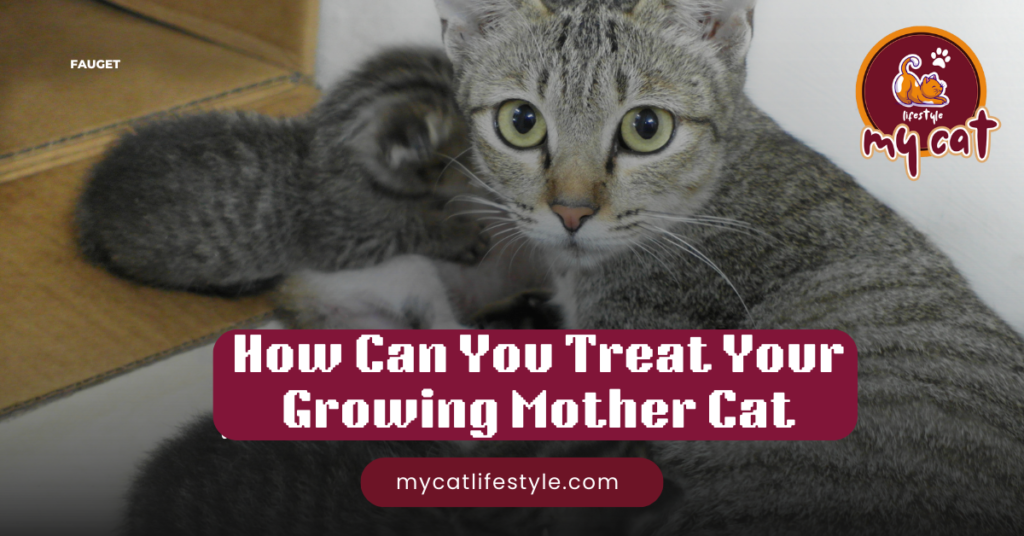
What Should I Do if My Cat Starts Hissing at My Kitten?
If your cat lets out a quick hiss at the kitten, it’s usually tolerable and not a cause for immediate concern. However, if the cat becomes more confrontational and starts to swat at the kitten, it’s important to intervene. In these situations, you should separate the cats to avoid the risk of the kitten getting injured. Creating a safe space where the kitten can escape from the interaction, such as a beloved cat tree or a closed-off area, can help reduce stress for both animals.
If the hissing continues or the interactions become too intense, consider separating the cats for a while to let things calm down. Allow the kitten to run to a safe spot where it feels secure, and monitor their interactions closely. Providing a closed-off area for the kitten or giving the cat its own space to retreat to can help them adjust more peacefully. This way, both the cat and the kitten can learn to coexist without constant tension.
How Long Will My Cat Hiss at My Kitten?
When you bring a new kitten into your home, it’s a huge adjustment for your older cat. Even if your established cat is usually friendly, it will need time to get used to the presence of the kitten. During this adjustment time, it’s normal for the older cat to hiss at the kitten, especially in the beginning. These hisses are the older cat’s way of setting boundaries and getting accustomed to the change.
However, if the cat hisses repeatedly for more than two to three weeks, it might be necessary to intervene. Keep a close eye on their interactions, and if the hissing doesn’t decrease, consider giving them more space or finding ways to help the older cat feel more secure. This period can be challenging, but with patience, your cats will eventually settle into their new routine together.

How To Stop an Older Cat From Hissing at a Kitten
If your older cat and new kitten are not getting along after several weeks, it might be necessary to separate them for small periods during the day. Giving the older cat a break can prevent it from feeling overwhelmed by the kitten’s energy. Set up separate places for them to sleep and relax, ensuring that each has their own space. For example, provide high perches or a cozy cave as a hiding spot where the kitten can’t reach. This helps the older cat feel secure and reduces the need for it to hiss.
Make sure your cat has access to facilities where it can escape, such as a room or area that’s off-limits to the kitten. Creating this escape space allows the older cat to retreat when it needs time alone, helping to ease tensions. Over time, as each cat gets used to having their own territory, the hissing should decrease, and they will learn to coexist more peacefully.
Will My Cat Eventually Stop Hissing at the Kitten?
In the majority of cases, cats will become acclimated to a new cat being around and will stop hissing after a week or so. As the kitten begins to mature, it becomes less likely to irritate the older cat. Over time, they both adjust to the new routine of sharing the same space. This natural process usually leads to the hissing gradually decreasing and eventually stopping altogether.
However, if the hissing continues for more than a couple of weeks, it may be a good idea to seek the advice of an animal behaviorist. They can offer guidance on how to help your cats adjust and live peacefully together. Most cats will eventually find their balance, but a professional can assist if the situation doesn’t improve on its own.
Do All Cats Hiss at Kittens?
Cats are known for their independent and sometimes unpredictable nature. When introducing a new kitten to a household, it’s not uncommon to notice your older cat start to hiss. This behavior might catch you off guard, especially if your cat has always been tolerant of new animals or people. However, if your cat has been rescued and has experienced previous trauma, it’s important to be particularly careful when introducing a new member to the family. Taking things slowly is crucial, as some cats need more time to accept the new kitten.
It’s also worth noting that not all cats will react negatively. Some may accept a new kitten quickly and may not hiss at all. Whatever the case, it’s essential to continue giving your cat the same love and attention as before, ensuring they don’t feel neglected or threatened by the new arrival. Your cat’s reaction is a reflection of their unique personality and past experiences, so patience and understanding go a long way in helping them adjust to their new companion.
How To Get Your Cat Used to a New Kitten
To help your cat get used to a new kitten, start preparing ahead of time. A week before bringing home the new arrival, introduce your cat to the new toys and supplies that the kitten will use. This way, the new pet doesn’t feel like a sudden change, and your cat will be more relaxed. When the kitten arrives, set up a comfortable room where it can get used to the new home away from the older cat. During the first few days or even the first week, keep the new kitten separated, allowing the older cat to become familiar with its sound and smell without meeting face to face.
Over time, let the cats gradually become accustomed to each other. By allowing the new animal to explore the house without direct contact with the adult cat, they are less likely to become highly stressed or lash out. This slow introduction process helps both the kitten and the older cat adjust to their new living situation peacefully.
Frequently Asking Questions
Why does my mother cat keep hissing at her kittens?
It’s not uncommon for a mother cat to hiss at her kittens as they grow. This behavior can be a way of establishing boundaries or disciplining them as they become more independent. If your cat has been rescued or has previous trauma, she might be more sensitive and tolerant of her kittens. Being careful and monitoring the interactions is important to ensure the well-being of both the mother and her kittens.
Why is my cat being aggressive to her kittens?
A mother cat may show aggressive behavior towards her kittens for several reasons. This can include stress from new animals or people in the environment, or if she’s had a traumatic past. It’s essential to introduce changes slowly and provide consistent love and attention to both the mother and the kittens. This helps create a more stable environment where aggression is less likely.
Why does my cat hiss at kittens?
When a cat hisses at kittens, it can be a sign of discomfort or a way to communicate her need for space. Cats, especially those with previous trauma, might be more hesitant when introducing a new kitten. Taking things slowly and being careful during the introduction process can help your cat accept the new kitten more easily.
Is it normal for a cat to growl at her newborn kittens?
Yes, it can be normal for a cat to growl at her newborn kittens. This behavior is often a form of communication or a response to feeling overwhelmed. Ensuring that the environment is calm and that the mother cat receives plenty of attention can help reduce stress and create a more harmonious setting for both her and her kittens.
Final Thoughts
In conclusion, it’s essential to understand that a mother cat’s behavior, including hissing or growling at her kittens, is often a natural part of feline communication and boundary-setting. These actions are not necessarily a cause for concern but rather a way for the mother cat to teach her kittens and establish her space. However, if your cat has experienced previous trauma or is less tolerant of new animals, extra care and patience are needed when introducing a new kitten to ensure a smooth adjustment. By providing consistent love, attention, and a calm environment, you can help ease any tensions and foster a positive relationship between the mother cat and her kittens.

